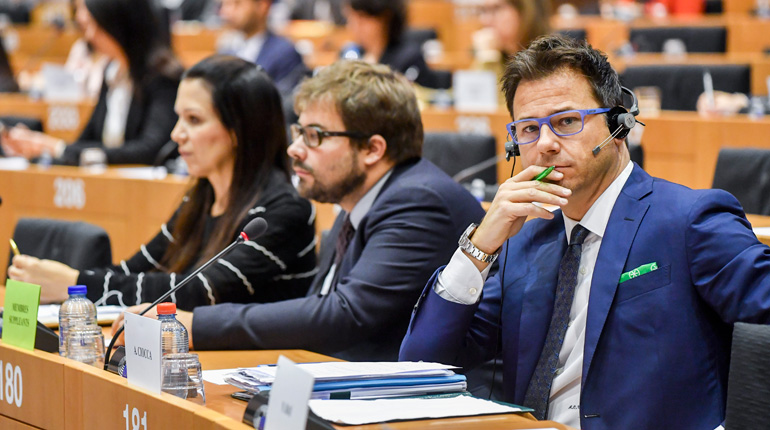Brussels advances tighter rules for gas security
14 October 2016 ITRE has backed proposals for more transparency in IGAs and for strengthened supply security regulations. (EP)
ITRE has backed proposals for more transparency in IGAs and for strengthened supply security regulations. (EP)
A move by Brussels to strengthen the security of Europe’s gas supply took a major step forward on Thursday after MEPs voted in favour of two key legislative proposals.
MEPs in the European Parliament’s committee on Industry, Research and Energy (ITRE) backed a proposal for more transparency in intergovernmental agreements (IGAs) on energy as well as a proposal for a strengthened Security of Gas Supply Regulation (regulation 994/2010) in a formal vote.
Both proposals, which were launched by the European Commission in February, are seen as controversial by some EU member states. This is because they would give regulators more powers to interfere in markets and supply negotiations with third countries such as Russia.
Proposed revisions to regulation 994/2010 include a ‘solidarity principle’, which states that sending gas to households, schools and hospitals in neighbouring countries during a crisis should take precedence over industrial end-users in the supplying country. The proposal was approved by 55 votes to four, with two abstentions.
"We cannot rely on goodwill and voluntary schemes if the supply of gas to a member state from outside is cut off. We need a binding mechanism to deliver gas to every protected consumer, be it a household, hospital or district heating installation, in every EU country in need," said MEP Jerzy Buzek (EPP, Poland), ITRE’s chairman and the file’s rapporteur.
"When one of the EU countries is affected by a very serious crisis of gas supply, its neighbours have an obligation to supply gas to that country’s most sensitive consumers – the so-called protected customers," Buzek added.
Buzek said Europe’s reliance on Russian gas made it vulnerable to supply disruptions, as highlighted by the Russia-Ukraine gas dispute in 2009.
"More than half of the gas needed in Europe depends on one monopolistic supplier. This makes Europe vulnerable, as we saw clearly in the gas crises of 2006, 2009 and 2014. What is more, almost all gas flowing in Europe crosses at least one state border. It is an international problem that requires international solutions," said Buzek.
The draft legislation also stipulates that gas companies shall notify the national regulator and the commission of supply contracts that have a duration of more than a year and which provide more than 40% of an EU member’s imports from third countries "after their conclusion or modification".
IGA transparency
A majority of MEPs in the committee also backed revised rules on IGAs. These could allow the commission to see agreements with third countries, such as Russia, before they are signed to ensure they comply with EU law. The draft regulation also applies to IGAs in electricity and oil.
The current framework, adopted in 2012, only allows the commission to see IGAs after they are signed. The new so-called ex ante provision has come under fire from several member states, which argue the proposed rules breach the EU principle of subsidiarity and proportionality.
"The principle of ex ante involvement by the commission, which would henceforth become obligatory, in checking an intergovernmental agreement or even in the negotiations themselves, would call into question the member states’ responsibility in this field, which should be theirs alone," the French Senate said in a letter addressed to the parliament in September.
Similar concerns have been raised by the governments of Portugal, Austria and Malta. Therefore, negotiations with the Council of the EU – which represents the EU member states – will likely be tough. The negotiations between the council, parliament and commission – so-called trialogues – are expected to start on 8 November, one parliament official told Interfax Natural Gas Daily.
"We in the European Parliament would like as much transparency as possible whereas the council still wants a fair amount of secrecy. That will be one of the sticking points during the trialogues," the official said.
The commission has been notified of 124 IGAs since 2012, of which 17 may not be in line with EU competition law. One recent example is Gazprom’s now-stalled South Stream pipeline, where Brussels was dissatisfied with many of the IGAs signed between Russia and the transit countries.
"South Stream is one of the main drivers behind the IGA proposal. Regarding South Stream, the commission identified shortcomings under the Third Energy Package and managed to block the project," said the official. "Many IGAs are still signed in secrecy. We [have] reached a point where [we can] not do it like this anymore."
Talk to us
Natural Gas Daily welcomes your comments. Email us at [email protected].
Liked this article?
To access similar premium content, you or your organisation must have a paid subscription. Sign up for a free 7-day trial to demo this service or call +44 (0)20 3004 6203 and one of our representatives would be happy to walk you through the service.
Sign up


